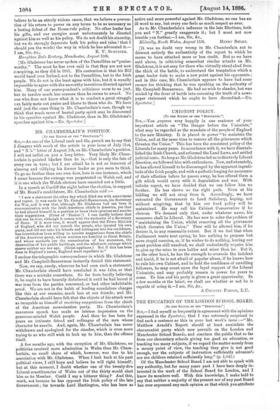MR. CHAMBERLAIN'S POSITION. [To THE EDITOR OF THE " SPECTATOR."'
SIR,—As one of the Liberal rank and file, permit me to say that I disagree with much of the article in your issue of July 31st, and " N.'s " letter of August 7th, on Mr. Chamberlain's position. I will not inflict on you a long letter. Very likely Mr. Cham- berlain is painted blacker than he is,—that is only the fate of
every one in turn ; but I am afraid he is not so innocent of abusing and vilifying his former leader as you seem to think. To go no further than our own door, here is one instance, which I name because the outrage was perpetrated on Welsh soil, and it is one which the Welsh electors have resented not a little.
In a speech at Cardiff the night before the election, in support of Mr. Brand's candidature, Mr. Chamberlain said :-
" I saw a statement the other day which filled me with amazement and regret. It was made by Mr. Campbell-Bannerman, the Secretary for War, and it was that, although Mr. Gladstone had not been in communication with the Irish-American chiefs in America, yet that he had placed himself in a position to know their opinions and receive their suggestions. (Cries of `Traitor.') I can hardly believe that this can be true, although it comes with the authority of a Secretary of State. If it were true, it would appear that the Prime Minister of England, who did not consult the people, who ignored his own party, and did not take his friends and colleagues into his confidence, has nevertheless been willing to receive suggestions from the chiefs of the American party, whose motives are hostility to Great Britain, and whose methods are the assassination of her statesmen, the destruction of her public buildings, and the wholesale outrage which spares neither sex nor age. (Great applause.) But if this has been done in England's name, England must repudiate it."
I enclose the telegraphic correspondence in which Mr. Gladstone
and Mr. Campbell-Bannerman instantly denied this statement.
Now, we say, surely, wherever he had seen such a statement, Mr. Chamberlain should have concluded it was false, or that there was a mistake somewhere. So far from hardly believing it, he ought to have heartily disbelieved it until he had learnt it was true from the parties concerned, or had other indubitable proof. We are not in the habit of hurling scandalous charges like this at our enemies, much less at our friends ; and Mr. Chamberlain should have felt that the objects of his attack were
as incapable as himself of receiving suggestions from the chiefs of the American assassination party. Mr. Chamberlain's rancorous speech has made an intense impression on the generous-minded Welsh people. And then he has been for years an intimate friend and colleague of the men whose character he assails. And, again, Mr. Chamberlain has never withdrawn and apologised for the slander, which is even more trying to us who still wish to look up to him, than the offence itself.
A few months ago, with the exception of Mr. Gladstone, no politician received more admiration in Wales than Mr. Cham- berlain, no small share of which, however, was due to his association with Mr. Gladstone. When I look back at his past political views, I still hope and believe he will right himself; but at this moment, I doubt whether one of the twenty-five Liberal constituencies of Wales out of the thirty would elect him as its Member. Could I say a bitterer thing P And this, mark, not because he has opposed the Irish policy of the late Government ; for towards Lord Hartington, who has been as active and more powerful against Mr. Gladstone, no one has an ill word to say, but every one feels as much respect as ever.
As to Mr. Chamberlain's influence in the late Elections, both you and "N." greatly exaggerate it ; but I must not now trouble you further.—I am, Sir, &c., Sidwelly, South Wales, August 11th. HENRY SHIRT.
[It was no doubt very wrong in Mr. Chamberlain not to distrust entirely the authenticity of the report to which he- seems to have attached more or less cl-edit. But as we have said above, in criticising somewhat similar attacks on Mr. Gladstone, it is not easy for those who virtually stand aloof from the thick of the battle, to understand the temptation which a great leader feels to make a new point against his opponents ; and in this case, Mr. Chamberlain appears to have had some excuse for thinking that he was speaking on the authority of Mr. Campbell•Bannerman. He had no wish to slander, but was misled by the fever of battle into assuming the truth of a news- paper statement which he ought to have discredited.—Ea. Spectator.]


































 Previous page
Previous page